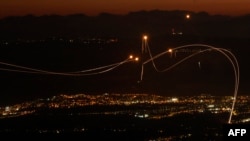Israel and Hezbollah engaged in an intense military exchange over the weekend, leading to fears that conflict in the Middle East will spiral.
On August 25 Israel conducted a preemptive air strike inside Lebanon against thousands of Hezbollah missile launchers, which the Israelis said were about to be used for a large attack on Israel. Shortly afterward, Hezbollah launched hundreds of rockets and drones at Israel. Fortunately, Israeli defenses kept casualties and infrastructure damage to a minimum.
Since the October 7 terrorist attack on Israel by Hamas and the subsequent war in Gaza, Hezbollah, which, like Hamas, is supported by Iran, has fired thousands of rockets into northern Israel. The intensity of this past weekend’s exchanges between Israel and Hezbollah was an exception, however, and a major conflagration between the two parties so far has not occurred.
At a press conference, U.S. National Security Advisor Jake Sullivan said the United States has been “concerned about the conflict escalating into an all-out regional war since October 7:”
“And we have worked round the clock with partners and allies, moving military assets, engaging in intensive diplomacy both publicly and privately behind the scenes to avert that outcome. We continue to work to avert that outcome. And our hope is that the events of last night [August 25], do not spill out into an escalation that leads to regional war.”
National Security Advisor Sullivan said the United States has “been working feverishly in Cairo as we speak with our team and the teams of the other mediators, as well as with the Israelis to get to a ceasefire and hostage deal along the framework that President [Joe] Biden laid out to get calm between Israel and along that border between Israel and Lebanon, and ultimately to get to a broader circumstance of regional stability.”
“And, of course, we think that a part of that is a credible path to a two-state solution for the Palestinian people as well,” he said.
The U.S. has recently bolstered its security presence in the Middle East. Pentagon Spokesperson Maj. Gen. Pat Ryder said, “We remain well postured to support Israel's defense against any aggression from Iran, Lebanese Hezbollah or other actors. And, as we've been from the start, we remain intently focused on de-escalating tensions in the region while also remaining focused on securing a ceasefire … to end the war in Gaza.”






